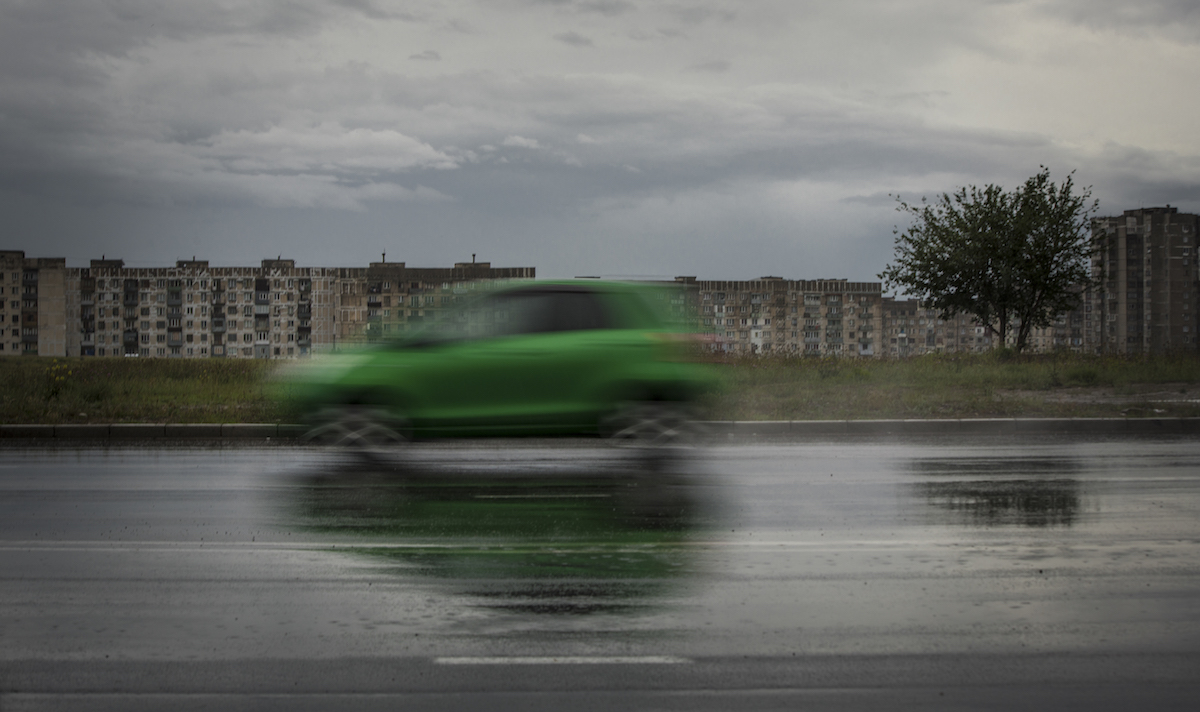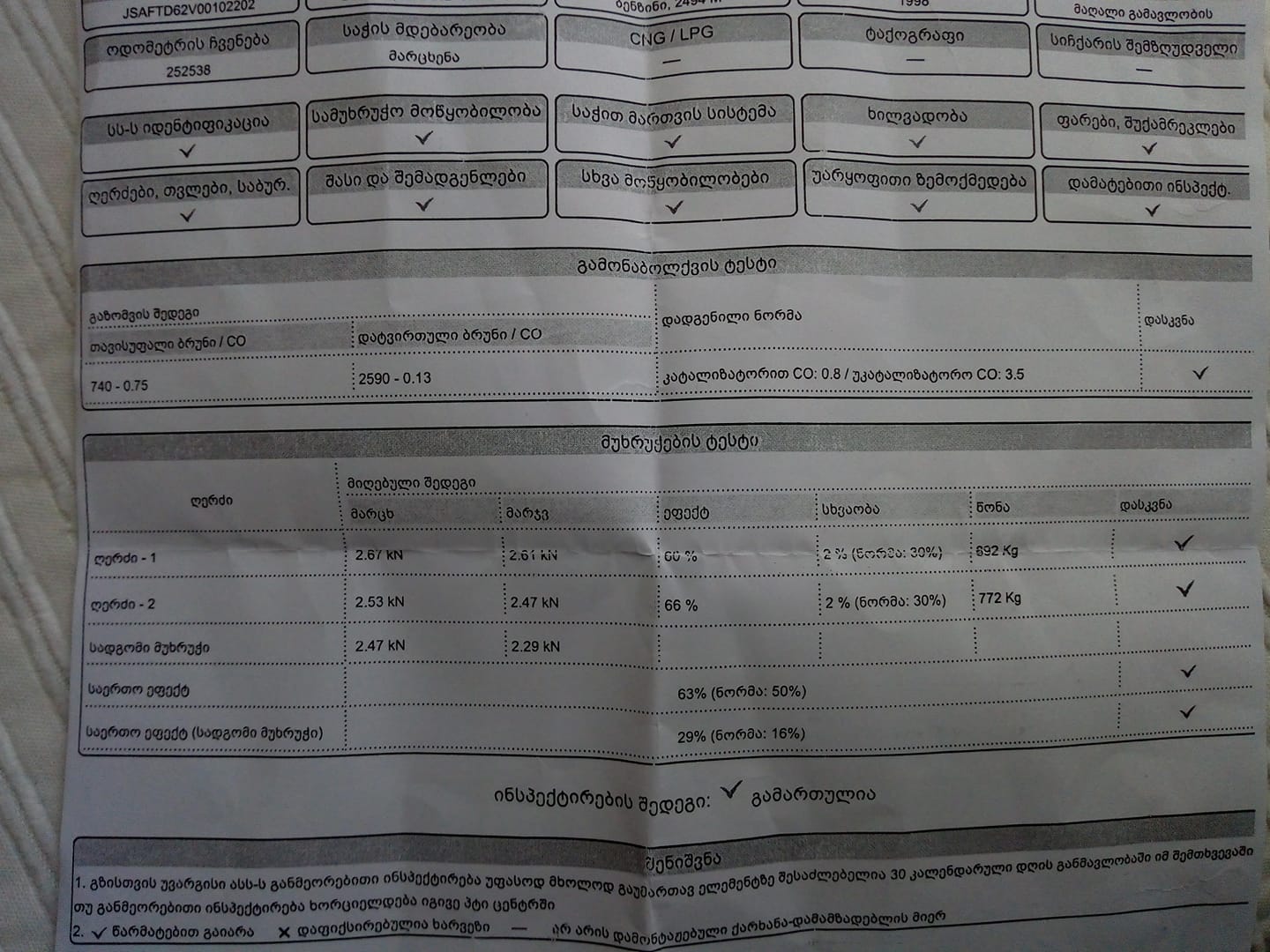Explainer: How to pass mandatory vehicle inspections in Georgia

As of 1 January 2019, all private vehicles in Georgia are obliged to undergo inspections, otherwise owners will face serious fines.
JAMnews looks into the most confusing issues regarding vehicle inspections in the country.
First and foremost: when do I have to have my vehicle inspected?
It depends when your car was registered. For example, if your vehicle was registered on 10 May, then the deadline to have your vehicle inspected is 10 May 2019.
Thus, if your car was purchased and registered in February, then you need to hurry – there is not much time left before the deadline. You can double-check the inspection date at this website: www.pti.ge.
• 581 – That’s how many people were killed in road accidents in 2015 in Georgia. What should we do?
Drivers whose cars were registered in January were unlucky. Since the beginning of the year, more than nine thousand vehicle owners have already been fined for failing to have their vehicles inspected.
Where are technical inspections carried out? Who can I contact if I have additional questions?
You can register online at www.pti.ge to avoid waiting in queues. You can also select the appropriate inspection centre. After registration you will receive a notification by mobile phone indicating the exact address of the centre and the number of your order.
You can also register by phone by calling the 14 84 hotline for free Mondays to Fridays between 09:00 – 18:00.
How much do vehicle inspections cost?
Motor vehicle inspections cost 60 lari [about $22], while freight and passenger transport vehicles cost 100 lari [about $ 37].
You can pay at the bank, via the internet or at payboxes.
It should be noted that additional expenses may arise. If problems are detected in the vehicle during technical inspection, they will also have to be fixed.
Remember that your vehicle may not pass inspection the first time around. All issues must be fixed within 30 days. If you are unable to complete the necessary repairs within that time period, you will have to pay for a second inspection.
What is checked during the inspection?
There are technical regulations and requirements which must be met by the vehicle, including the condition of the brakes, steering system, headlights, interior lighting, electrical equipment, axles, wheels, tires, suspension and chassis.
In addition, the car must not exceed pollution levels and produce noise levels above the norm – the level of emissions and noise level will be measured.
[toggle title=”Georgian drivers are sharing their experiences of passing the vehicle inspections on Facebook. We’ve selected some of the most interesting comments, which can be found by clicking here: ⇒“]
1. All lighting installed in the car at the factory assembly (including the lights in the cabin) must be in order.
2. The front and rear windows must be without cracks, without noticeable damage which may distract a driver’s attention – a chip in the windshield must not exceed five millimetres.
3. Wipers must be in perfect working condition. All mirrors must be intact. All doors must be in good condition.
4. Externally, the car should be in a normal condition – without significant dents or signs of rust.
5. Headlights must be clean and evenly shine. This applies to front, rear and emergency lights.
6. Tyres must be checked and not be worn or damaged. All tires must be the same. There must be a spare tyre in the car as well.
7. Brakes and handbrake must be in perfect working order, in addition to the steering mechanism.
8. The underside of the car is also checked. Pay attention to possible oil leakages. Consider washing your car before bringing it in to inspection, including the underside.
9. The underside of the car should not have corroded elements or parts.
[/toggle]
What documents do I need for vehicle inspections?
Your vehicle’s registration card, your own ID and your receipt of payment for inspection services.
What will happen if my vehicle doesn’t pass?
A driver who tries to do without technical inspections will be fined 50 lari [about $19], legal entities or an individual entrepreneur will be fined 200 lari [about $75].
If you provide such a car for someone else to drive, then 50 lari [about $19] will have to be paid by both the owner and the driver. If you don’t repair your vehicle, then each month you will have to pay 50 lari [about $19] or 600 lari [about $225] a year. The fine must be paid within a month.
If this fine is not paid, an additional 500 GEL [about $188] will be charged. If such a punishment turns out to be ineffective, then the driver will be deprived of his license for six months.
From 14 January onwards, the lives of those who aren’t a fan of the technical inspections has become more complicated. “Smart cameras” have been implemented on Georgian roads which easily capture the absence of a corresponding inspection certificate on the windshield.
In just four days around 6,654 penalties were issued due to these smart cameras. Prior to that, from the beginning of the year, patrols had issued 2,404 penalties to drivers of vehicles without technical inspection certificates.
How often should I have my car inspected?
Starting next year – and provided that all vehicles in the country are inspected – cars will undergo subsequent inspections determined by the production date of their car.

Cars manufactured less than four years ago must be inspected at the end of four years from their manufacturing date.
Cars between the ages of four and eight should be inspected once every two years.
Cars older than eight years must pass a technical inspection annually.
Which vehicles do not need to undergo technical inspections?
Cars with transit numbers or motorcycles, cars made before 1960, models no longer in production, cars with historical value or in original condition, cars unable to move and which are in a static position and vehicles which cannot exceed 25 km/ hour.
Foreigners
Your citizenship does not matter – foreigners, like Georgian citizens, drive on Georgian roads and must undergo technical inspection.
Why are inspections necessary?
The authorities cite three main reasons:
1. Requirements set by the European Union in order to adhere to European standards;
2. The prevention of accidents and road accidents;
3. The reduction of environmental pollution.
Could this leave room for corruption?
Technical inspection services must be paid for via banks and payboxes. Moreover, video monitoring devices are installed at all inspection centre sites. Footage will be saved for 14 months.
Does the owner have to take their vehicle in for inspection?
No, this is not necessary. The vehicle can be entrusted to a friend, husband, wife, father, etc.
In addition, there is a special service which, on request, will take your car in for inspection and have it brought back once all procedures are completed. Naturally, it’s not free, but you will save time and nerves. One of these services can be found on the www.caru.ge website.
Initial results
According to the Association of Automobiles Inspection, 130,000 cars have passed inspection and 40,000 of them have been found to have flaws.
Thirty per cent of these cars have not yet been brought in for a second round of inspections.
According to official information, checks have shown that issues are largely found with braking systems, steering and elevated exhaust levels.
Two-hundred marshrutkas (minibuses) have failed inspections, while 100 busses and 42 Tbilisi City Hall vehicles have also failed.
According to the Ministry of Economy, almost half of the cars on Georgian roads were made over 20 years ago.
According to audit data, cars in Georgia contribute around 71 per cent in air pollution.


















